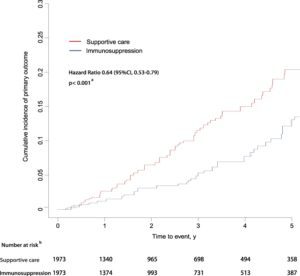In a recent study Hao et al (CJASN, 2023) studied nearly 4000 Chinese patients with IgA nephropathy.
Why does this matter?
IgA nephropathy is the commonest type of glomerulonephritis, which is responsible for 10% of the patients on dialysis.
The effects of immunosuppression (drugs to suppress the immune system) in the treatment of IgA nephropathy remains highly controversial. The study was done to assess the effect of immunosuppression, compared with supportive care (no immunosuppression).
What did this study show?
Method. A group of 3946 patients with IgA nephropathy, including 1973 who had immunosuppressive drugs, and 1973 similar patients who had supportive care, in a nationwide register data from January 2019 to May 2022 in China was analysed.
Results. Among 3946 individuals (mean age 36 years, mean eGFR 85 ml/min), 396 had an adverse event affecting their kidneys (e.g. kidney failure that required dialysis or a transplant), of which 156 (8%) were in the immunosuppression group and 240 (12%) in the supportive care group.

Conclusion. Immunosuppressive therapy, compared with supportive care, was associated with a 40% lower risk of adverse kidney events in patients with IgA nephropathy. Though this study did not state which immunosuppressive drug was best.
How does this affect you?
It will only affect you if you have IgA nephropathy. If you do, you should ask your kidney doctors if drugs that suppress the immune system will benefit you. There are many new drugs (called ‘biological agents’) that are coming through and show great promise.
Last Reviewed on 19 September 2023
